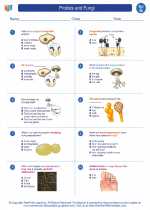Fossil Records
Fossil records are the preserved remains or impressions of organisms that lived in the past. They provide important evidence for understanding the history of life on Earth and the processes of evolution. Fossils can be found in rocks, sedimentary layers, and even ice, and they can range from tiny microorganisms to large dinosaurs.
Types of Fossils
There are several types of fossils, including:
- Body Fossils: These are the preserved remains of the actual body parts of an organism, such as bones, teeth, shells, and feathers.
- Trace Fossils: These are evidence of an organism's activity, such as footprints, burrows, and nests.
- Mold Fossils: These are imprints of an organism left in the surrounding rock after the organism has decayed or dissolved.
- Cast Fossils: These form when a mold is filled with minerals, creating a replica of the original organism.
Importance of Fossil Records
Fossil records are crucial for understanding the history of life on Earth, as they provide insight into the diversity, distribution, and evolution of organisms over time. They also help scientists date the age of rocks and the layers of the Earth's crust, allowing them to reconstruct past environments and climates.
Studying Fossil Records
To study fossil records, scientists use various methods, including:
- Fossil Excavation: Digging and carefully removing fossils from the ground.
- Carbon Dating: Using the radioactive decay of carbon isotopes to determine the age of fossils and rocks.
- Comparative Anatomy: Examining the similarities and differences in the structures of fossilized organisms to understand their relationships and evolutionary history.
- Stratigraphy: Analyzing the layers of rock and sediment to determine the relative ages of fossils and the sequence of events in Earth's history.
Study Guide
Here are some key points to remember when studying fossil records:
- What are fossils and why are they important in the study of the history of life on Earth?
- Describe at least three different types of fossils and how they are formed.
- Explain the significance of fossil records in understanding evolution and past environments.
- How do scientists use fossil records to determine the age of rocks and the Earth's crust?
- Discuss the methods and techniques used by scientists to study and interpret fossil records.
Understanding fossil records is essential for comprehending the vast history of life on Earth and the processes that have shaped the diversity of organisms we see today.
.◂Science Worksheets and Study Guides Seventh Grade. Protists and Fungi

 Worksheet/Answer key
Worksheet/Answer key
 Worksheet/Answer key
Worksheet/Answer key
 Worksheet/Answer key
Worksheet/Answer key
 Worksheet/Answer key
Worksheet/Answer key
 Vocabulary/Answer key
Vocabulary/Answer key
 Vocabulary/Answer key
Vocabulary/Answer key
 Vocabulary/Answer key
Vocabulary/Answer key
 Vocabulary/Answer key
Vocabulary/Answer key
 Vocabulary/Answer key
Vocabulary/Answer key
 Vocabulary/Answer key
Vocabulary/Answer key
